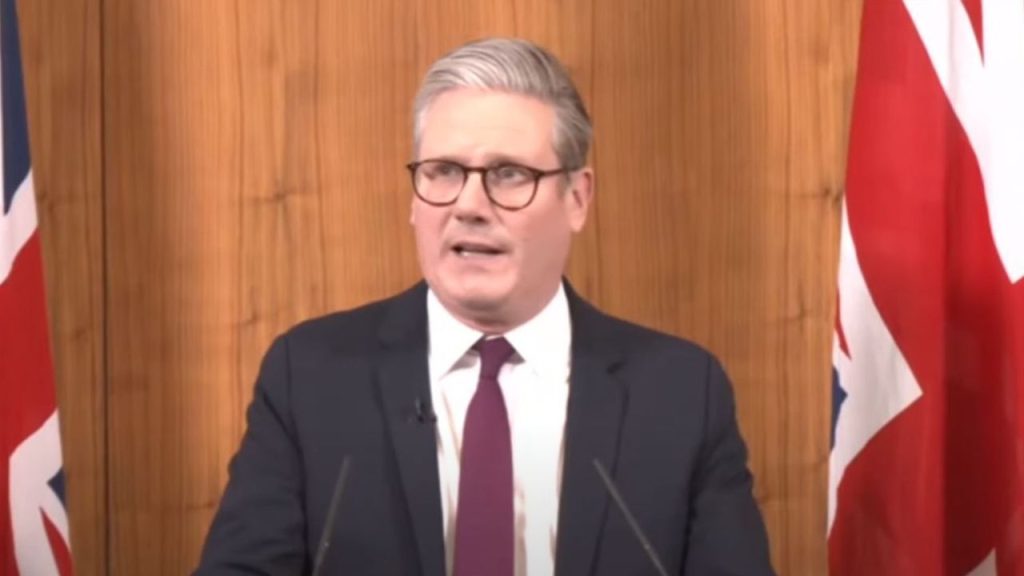Sir Keir Starmer has expressed his intention to reduce the number of people sent to prison through renewed efforts aimed at cutting reoffending rates.
During his first press conference as prime minister, Sir Keir highlighted the issue of many individuals returning to jail “relatively quickly” after being incarcerated. He emphasized the need for interventions to prevent young people from engaging in knife crime as an early priority for his new government.
Acknowledging the challenge of prison overcrowding, Sir Keir stated, “We’ve got too many prisoners, not enough prisons,” while cautioning that there is no quick-fix solution to this complex issue.
His administration’s approach includes appointing businessman James Timpson as prisons minister. Timpson, known for his company’s policy of employing ex-offenders, has previously advocated that only a third of prisoners should be incarcerated, criticizing what he described as a societal “addiction to punishment.”
Labour, having secured a significant victory in the recent general election, has pledged to review sentencing policies as part of its broader agenda upon returning to power for the first time since 2010. The party inherits a pressing crisis in the UK’s prison system, exacerbated by overcrowding issues that have prompted the use of early release schemes.
The Prison Governors’ Association recently warned of imminent overcrowding crises in jails across England and Wales, underscoring the urgency of addressing systemic challenges within the penal system.
Former Conservative Justice Secretary Alex Chalk had previously announced plans for early prisoner releases in response to record-high prison populations. He stressed the need to manage prison resources effectively while ensuring sufficient capacity to detain the most dangerous offenders for public safety.
Details of Labour’s sentencing review are forthcoming, but Timpson’s appointment signals a potential shift in policy direction under Sir Keir’s leadership. His elevation to the House of Lords allows Timpson to assume responsibilities as prisons minister within the Ministry of Justice.
The businessman told a Channel 4 podcast in February that prison was a “disaster” for around a third of prisoners, and another third “probably shouldn’t be there”.
He said too many people being in prison for “far too long” was an example of “evidence being ignored because there is this sentiment around punish and punish”.
“We’re addicted to sentencing, we’re addicted to punishment,” he added.
Prison ‘escalator’
Asked about his comments at a Downing Street press conference, Sir Keir did not offer a view on whether he agreed with those estimates.
But he added: “We do need to be clear about the way in which we use prisons.
“For so many people [who] come out of prison, they’re back in prison relatively quickly afterwards.
“That is a massive problem that we have in this country, that we do need to break.”
He said his party wanted to cut knife crime in particular, and cited his plan to set up a network of “youth hubs”.
Sir Keir, a former lawyer, added: “I’ve sat in the back of I don’t know how many criminal courts and watched people processed through the system on an escalator to go into prison.
“I’ve often reflected that many of them could have been taken out of that system earlier if they’d had support”.
Steve Searby – from the Prison Officers’ Association, which represents thousands of prison workers – told BBC Breakfast the situation “has been coming for years and years”.
“I cannot see how we are getting out of this crisis,” Mr Searby said. “The situation isn’t something which is going away, you have to deal with it. There is no immediate fix.”
He added: “You need to get people who know what they are talking about around the table.”
Labour aims to create 20,000 new prison places by granting ministers authority to override local councils on planning decisions. Concurrently, the party intends to uphold the previous government’s initiative allowing some lower-level offenders to be released up to 70 days early.
Sir Keir Starmer criticised Conservative ministers for what he termed a “mess,” attributing it to insufficient prison construction and mismanagement of the prisons budget. He defended retaining the early-release scheme, citing the inability to rapidly construct new prisons, stating, “We don’t have the prisons we need, and I can’t build a prison within 24 hours.”
Official figures released on Friday show the prison population in England and Wales stands at 87,453, nearing the operational capacity of 88,864.
Meanwhile, the Scottish government, under SNP leadership, plans to release between 500 and 550 inmates in the coming months.
In his first Labour cabinet meeting in 14 years, Sir Keir Starmer emphasized the importance of integrity and honesty among his ministers. Following this meeting, he faced questions from journalists at his inaugural press conference as Prime Minister, where he pledged to make tough decisions on tax hikes with transparency.
Labour’s landslide victory in the recent General Election, securing 412 seats across the UK compared to the Conservatives’ 121, has given the party, in Sir Keir’s words, “a clear mandate to govern for all four corners of the United Kingdom.” He announced plans to tour all four UK nations in the upcoming days to underscore this commitment.

